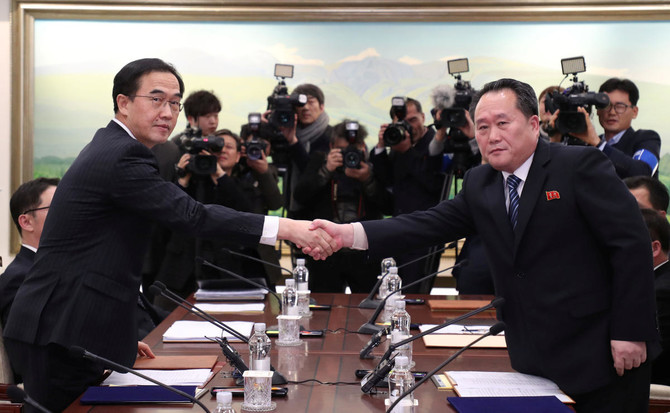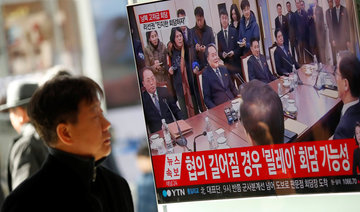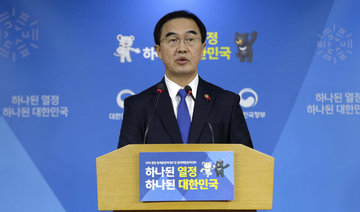SEOUL: North Korea said after its first talks with South Korea in more than two years that it would not discuss its nuclear weapons with Seoul because they were aimed only at the United States, not its "brethren" in South Korea.
In a joint statement after 11 hours of talks North Korea pledged to send a large delegation to next month's Pyeongchang Winter Olympics in South Korea but made a "strong complaint" after Seoul proposed talks to denuclearise the Korean peninsula.
Officials from both sides said they agreed to meet again to resolve problems and avert accidental conflict, amid high tension over North Korea's program to develop nuclear missiles capable of hitting the United States, but Pyongyang said disarmament would not be part of the discussions.
"All our weapons including atomic bombs, hydrogen bombs and ballistic missiles are only aimed at the United States, not our brethren, nor China and Russia," Pyongyang's chief negotiator, Ri Son Gwon, said.
"This is not a matter between North and South Korea, and to bring up this issue would cause negative consequences and risks turning all of today's good achievement into nothing," Ri, chairman of the North's Committee for the Peaceful Reunification of the Fatherland, warned in closing remarks.
U.S. President Donald Trump and North Korean leader Kim Jong Un have exchanged threats and insults in the past year, raising tensions on the peninsula.
A spokesperson for the White House's national Security Council said North Korean participation in the Olympics would be "an opportunity for the regime to see the value of ending its international isolation by denuclearising."
The White House did not comment on the United States being the only potential target of North Korea's nuclear weapons.
In spite of Ri's remarks, South Korea's Unification Ministry said it believed inter-Korean ties and a series of steps agreed in the talks on Tuesday could lead to discussion of a "fundamental resolution" of the nuclear issue.
"We will closely coordinate with the United States, China, Japan and other neighbours in this process," the ministry said in a statement.
It said South Korea had asked North Korea to halt hostile acts that stoke tension and that North had agreed that peace should be guaranteed in the region.
The North-South meeting came after a year of ramped-up North Korean missile launches and its sixth and most powerful nuclear test.
The United States, which has 28,500 troops stationed in South Korea as a legacy of the 1950-1953 Korean War, initially responded coolly to the idea of inter-Korean meetings, but Trump later called them "a good thing."
"At the appropriate time, we'll get involved," he said on Saturday.
The United States has led an international campaign to step up sanctions on North Korea to press it to give up its weapons programmes.
The U.N. Security Council last month unanimously imposed new sanctions on North Korea in response to its test-firing of an intercontinental ballistic missile. Pyongyang called the sanctions an act of war.
HIGH HOPES
Earlier on Tuesday, Seoul said it was prepared to lift some sanctions temporarily so North Koreans could visit South Korea for the Winter Olympics. North Korea said its delegation would include athletes, high-ranking officials, a cheering squad, art performers, reporters and spectators.
South Korea has unilaterally banned several North Korean officials from entry in response to Pyongyang's missile and nuclear tests.
Talks will be held soon to work out the details of bringing the North Koreans to the Olympics, the South's unification ministry said.
Tuesday's talks, the first between the two Koreas since 2015, were held in the three-storey Peace House on the South Korean side of Panmunjom truce village that lies between North and South.
"We came to this meeting with the thought of giving our brethren, who have high hopes for this dialogue, invaluable results as the first present of the year," Ri said at the start of the meeting.
Seoul said it proposed reunions of members of families divided between North and South in time for February's Lunar New Year holiday, but the joint statement made no mention of any agreement on reunions.
North Korea has finished technical work to restore a military hotline with South Korea, Seoul said, with normal communications set to resume on Wednesday.
North Korea cut communications in February 2016, following the South's decision to shut down a jointly run industrial park in the North.
North Korea responded "positively" to the South's proposal for athletes from both sides to march together in the opening ceremony of the Winter Olympics, Seoul said.
Athletes of the two sides have not paraded together at an international sports event since the 2007 Asian Winter Games in China.
On Tuesday, China's Foreign Ministry said it was happy to see talks between North and South Korea and welcomed all positive steps. Russia echoed the sentiment, with a Kremlin spokesman saying: "This is exactly the kind of dialogue that we said was necessary."
Some U.S.-based analysts have hailed the North-South talks as an opening to pursue diplomacy to resolve the crisis, but others see an attempt by North Korea to weaken U.S. pressure so that it is eventually accepted as a nuclear-armed state.
Evans Revere, a former senior U.S. diplomat for East Asia, said that by engaging Seoul, North Korea was clearly seeking to weaken the U.S.-South Korean alliance and it was important that Seoul had raised the nuclear issue to show it was not just a U.S.-North Korea matter.
Harry Kazianis, of the conservative Center for the National Interest, saw the talks as an attempt by Kim to buy time to complete development of his weapons program.
International Olympic Committee (IOC) President Thomas Bach said of the North-South agreement on the Pyeongchang games: “These proposals mark a great step forward in the Olympic spirit.”
The IOC would await official proposals on the number and names of athletes from the North and such matters as flag, anthem and ceremonies, he said.
























